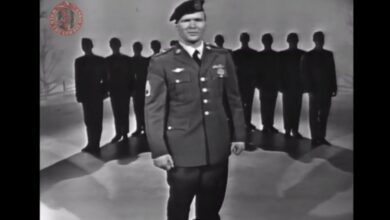I roam this path in solitude, where shadows softly pour, my heart’s a silent echo, longing evermore.
Marty Robbins was not merely a singer; he was a master storyteller whose tales intertwined the harshness of the American West with deep reflections on themes of love, loss, and the human condition. Born on September 26, 1925, in Glendale, Arizona, Robbins came of age during a flourishing country-western cultural movement. With humble beginnings, he was influenced by the sounds of Western radio stations, which laid the groundwork for his extraordinary career. His ascent to fame took off in the early 1950s and continued to thrive over the decades, solidifying his status as one of the most prolific figures in the history of country music.
Robbins’ unique sound was firmly rooted in country traditions, yet it also embraced contemporary styles and diverse musical influences. His versatility transcended genres, incorporating elements of pop, rock, and traditional Mexican music, which resulted in a diverse catalog that appealed to a broad audience. Songs like “El Paso,” with its haunting narrative of love and violence, highlighted his storytelling prowess, while others captured the spirited essence of honky-tonk music. Through his varied lyrical themes and musical styles, Robbins connected with listeners from many walks of life, ensuring the enduring appeal of his work across generations.
A standout feature of Robbins’ career was his ability to evoke poignant emotions through his storytelling. For instance, “I Walk Alone,” released in 1968, exemplifies his skill in crafting personal narratives that resonate with listeners’ own experiences. This song reflects not only the struggles of a traveling artist but also the universal feelings of isolation and desire. Robbins’ poignant lyrics articulate the emotional burdens we all carry, conveying a timeless truth that resonates with audiences of all ages and backgrounds.
The arrangement of “I Walk Alone” further amplifies its emotional resonance. The chemistry between the twang of the guitars and the sorrowful tones of the fiddle enhances Robbins’ rich baritone, creating a soundscape that feels both warm and melancholic. The song’s meticulous arrangement balances invigorating rhythms with heartfelt melodies that echo its themes of solitude and perseverance. This duality not only showcases Robbins’ songwriting brilliance but also fosters a profound emotional connection with listeners, making them feel as though they are part of his journey.
In addition to his exceptional songwriting and vocal skills, Robbins was a talented guitarist. His proficiency on the instrument added an extra layer of emotion to his performances, enabling him to communicate complex feelings through music. Throughout his touring years, Robbins infused various musical influences into his work, keeping his sound fresh and captivating throughout his career. This adaptability significantly contributed to the lasting appeal of his music, including “I Walk Alone,” which continues to touch new audiences.
Robbins’ legacy is woven into the fabric of American music, leaving a lasting impact on countless artists across multiple genres. In the realm of country music, he particularly influenced future generations, inviting musicians to explore and define their artistic expressions. A proud member of the Grand Ole Opry and a recipient of numerous accolades, including Grammy awards, Robbins built a legacy that would be cherished by fans and fellow musicians alike.
Marty Robbins’ songs continue to resonate, reaching new audiences while demonstrating the timeless nature of his artistry. “I Walk Alone” remains relevant today, offering comfort and insight to listeners who appreciate its exploration of life’s challenges. The emotional power of Robbins’ music delves into themes of love, regret, and resilience—universal experiences that transcend time and resonate with diverse listeners.
For many, “I Walk Alone” serves as a reminder of life’s struggles, standing as a testament to the strength found in memories and past experiences. Robbins’ extraordinary ability to express the paradox of loneliness intertwined with nostalgia is prevalent in many of his songs, providing a haven and a mirror for listeners. This collective engagement with his music fosters a sense of community, allowing individuals to connect over shared experiences and stories.
As the music landscape evolves, Marty Robbins’ influence remains significant. He exemplifies the deep emotional connections that can be forged through song and the storytelling power inherent in music. His talent for painting vivid images with lyrics and melodies ensures that new generations of listeners will discover and appreciate his artistry. Through beloved songs like “I Walk Alone,” Robbins’ legacy as a master storyteller and emotive performer is firmly established in the history of music.
Robbins’ life extended beyond music, marked by his endeavors in acting, particularly in Western films, which showcased his diverse talents and devotion to the culture he cherished. This facet of his career further cemented his status as an icon of American pop culture, bridging the realms of music and film. His enduring appeal is a testament to both his artistic prowess and his capacity to tap into the human experience, ensuring his stories continue to resonate deeply in the hearts of listeners.





